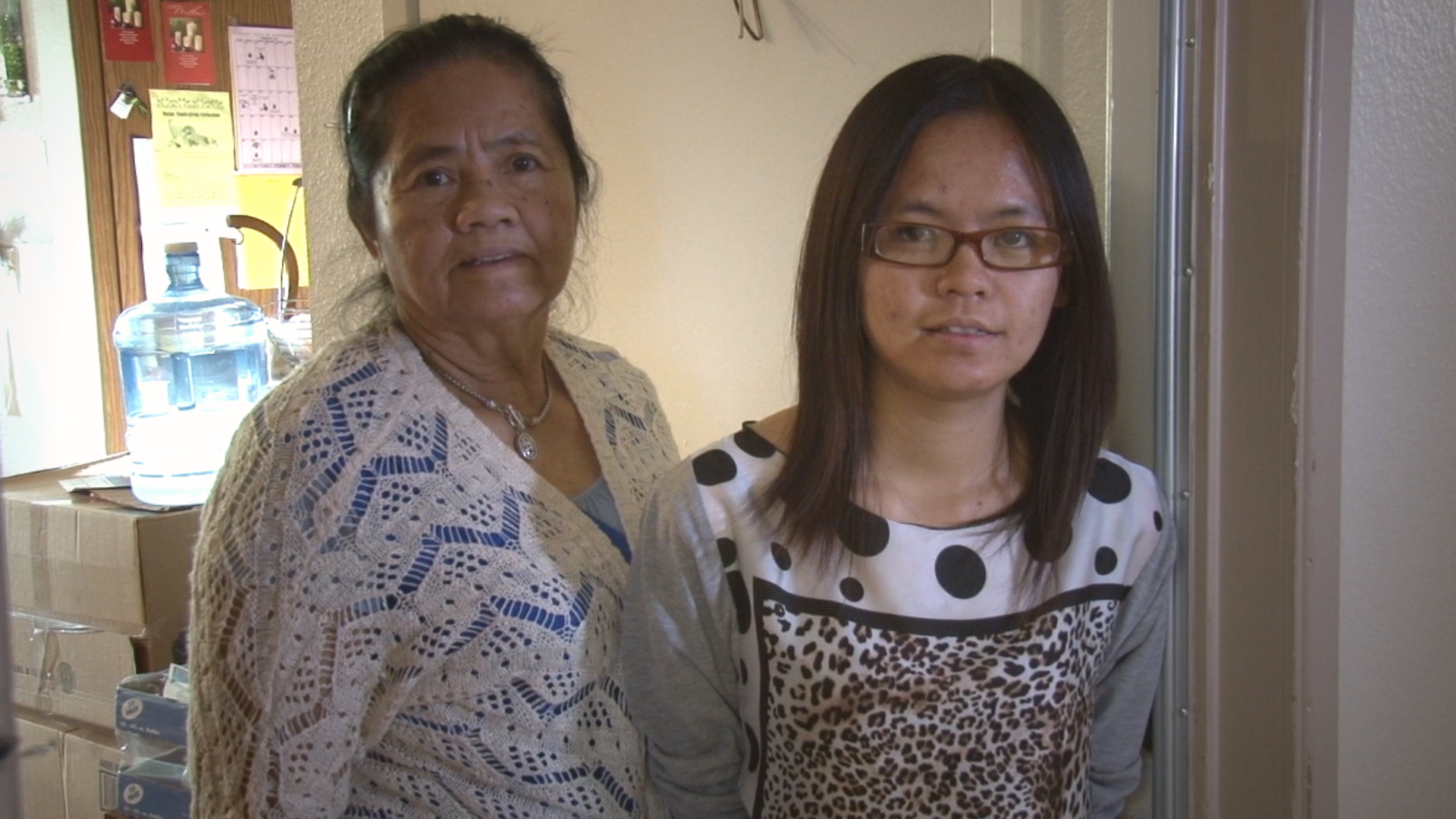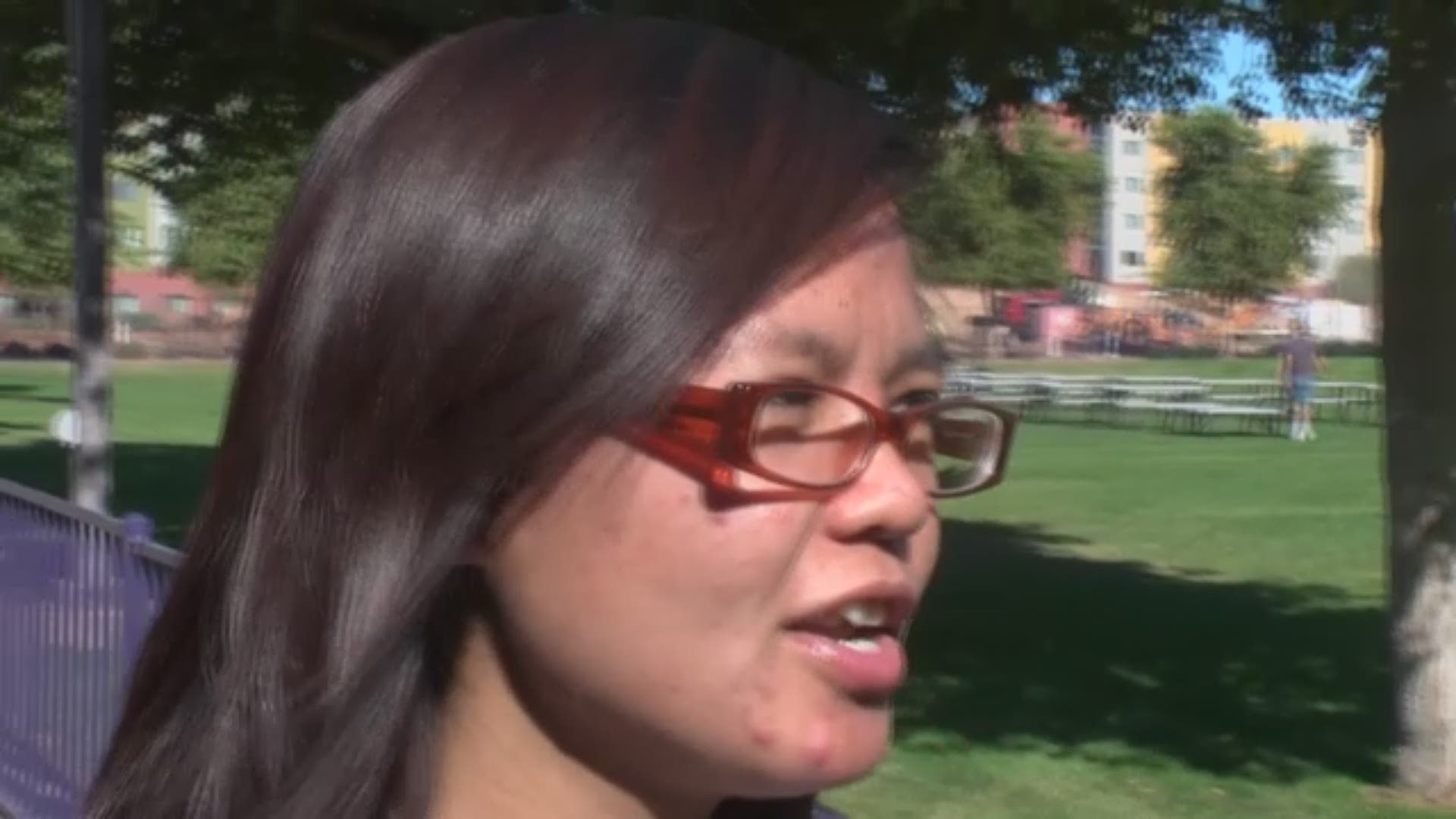Very few refugees overcome the physical, mental, and financial demands of American universities. In Arizona alone, the dropout rates are alarming.
“Everything is possible. You just have to have focus on that and then study hard. One day you will get your goal,” said Burmese refugee Lydia Cung Hnem Khim.
Stories: • Arizona an unlikely haven
• A new home
• College a challenge
• A father's sacrifice
• About the project
• Refugees from Burma
• Refugees from around Africa
• Refugees from Iraq, Cuba, Afghanistan
• Refugees from Southeast Asia
Khim is a new American chasing the dream and an education at Grand Canyon University.
“When I came here I want to go to school because I didn’t finish my school in my country so I’d like to continue my education,” she said. "But, unfortunately, I am average and couldn’t go to this school."
Online school was her solution. It filled in the gaps left by the religious and political persecution that pushed Khim from Myanmar in 2007.
“I was in high school,” she said. “My teacher found a tutor for me in here. So I went here and then it was amazing and I really wanted to go to college here.”
Many refugee students don’t make it to GCU like Khim did.
If they arrive in the country close to their 18th birthday, they’re expected to work and can’t attend free public schools in the U.S., refugee families say.
But in a new country, education may be a refugee family’s only ticket to a better life.
“The opening door is to really have the college degree,” researcher Dr. Barbara Kilmek said. “And if we still believe it’s still a valid statement, then what that means is that they will do whatever it takes.”
Klimek is a clinical associate professor at the ASU School of Social Work. She’s considered the foremost refugee researcher in Arizona if not the Southwest United States.
At one time, Klimek led Catholic Charities, one of the large refugee resettlement agencies in the state before focusing on academia and research at ASU.
Kilmek feels that Asians are a model minority group when it comes to education, but the pursuit of education causes many of them unhappiness and stress, because of pressure from their family and peers.
Despite the stress, education is the American dream for many refugee families.
“If you really can study hard, and then you can do, college is a really good thing,” said Khim.
Three out of four students who take remedial classes at schools like GCU will never graduate, according to a study from Complete College America. Neither will one out of every three students on campus, Harvard researchers wrote in a 2011 paper.
“It is really different with my country and here ... the culture or whatever. Everything is a big change for me,” Khim said. “So I have to learn from the start, step by step, a little by a little, and I’m still learning.”
When she’s not at GCU, Khim spends time with her aging grandmother Gloria Cho-Cho Te, her only family in Arizona.
Last year, Khim, 24, and her grandmother met for the first time.
“I remember waiting at the airport. All I had were her pictures. I was so excited, I’d never seen her before in reality,” said Cho-Cho Te through her granddaughter, who translated.

In a region of farmers and agriculture, Cho-Cho Te was educated and trained as a midwife, nurse and health assistant in Rangoon, Myanmar, in the 1960s. Cho-Cho Te can speak English better than most incoming refugees because she learned it alongside her medical training (all given in English because that’s how the equipment was labeled).
She worked for 36 years as a health assistant before retiring to a small village. There she began a practice in the Chin State delivering babies and treating malaria and snakebites.
Cho-Cho Te pursued refugee status in 2007 after government soldiers visited her clinic to shut down her business.
Several days before, she’d treated some travelers passing through her village who’d fallen ill with malaria. The soldiers told her they were “spies” and political enemies of the regime. After a lengthy interrogation in a government military base, officials said she couldn’t leave her village.
As a political prisoner, Cho-Cho Te’s livelihood and physical safety were in danger and she fled to Malaysia.
After two years in a refugee camp in Malaysia, Cho-Cho Te was interviewed, researched and resettled in the U.S., arriving in 2009.
The rest of her family was already grown and had scattered across Burma, the U.S. and the globe in the years before.
Even as grandmother and granddaughter, Khim and Cho-Cho Te had never met until Khim’s family sent her to live with Cho-Cho Te in 2015 for college.
“I want her to graduate with a degree and get a really good job because, although she could get a job without going to school, it will be hard and tiring," Khim’s grandmother said through a translator. "With one degree I think she can survive and have a better life.".
Following resettlement law, Cho-Cho Te’s caseworker found her employment at a 99-cent store, collecting shopping carts in the parking lot. Cho-Cho Te worked there for three years before arthritis pushed her into a second retirement.
Unfortunately, her medical training didn’t transfer well to the U.S., where medications and the style of care are different. For many refugees, their jobs don’t always take advantage of the skills and knowledge they have.
Because Cho-Cho Te met employment requirements and is now a naturalized American citizen, she receives Supplemental Security Income (SSI) benefits and lives rent-free at a senior housing development.
She’s a typical retired, aging American woman and is a regular face at Bible studies, and computer and knitting classes at the Helen Drake Senior Center.
Cho-Cho Te’s own advanced education in Burma helps her pass the long hours alone and cheer her granddaughter’s growing independence.
This understanding is not always present in traditional, elder-centric refugee homes. In those more traditional homes, Cho-Cho Te would also never be alone.
“It’s when the grandchildren grow up, they need their space,” said Fei Sun, a geriatric health researcher. "And typically there’s much conflict between the grandchildren and the grandparents. Sometimes that could also involve the adult children, because the way they raise the kids is different."
Fei Sun is an associate professor at the ASU School of Social Work. His research broadly surrounds mental health and aging.
Specifically, he focuses three interrelated areas: Dementia and family care-giving, risk factors for successful aging, and health and social service utilization in older adults. One of his ongoing projects focuses on the stress and coping experience of Chinese American dementia family caregivers in Phoenix.
His experience within the Arizona Chinese community can be extended in part to other southeast Asian refugee peoples such as Khim and Cho-Cho Te, because many cultural traditions and values are shared among groups.
Khim and her grandmother aren’t dreaming about nice things or fame, but seeing their loved ones succeed.
“Just like the Bible said about Israel, America is a land flowing with milk and honey. It’s really heaven in here,” said Cho-Cho Te.
It’s a place where a young woman’s dream may come true.
“Never give up on your dream,” said Khim.
And her dream is truly American.


